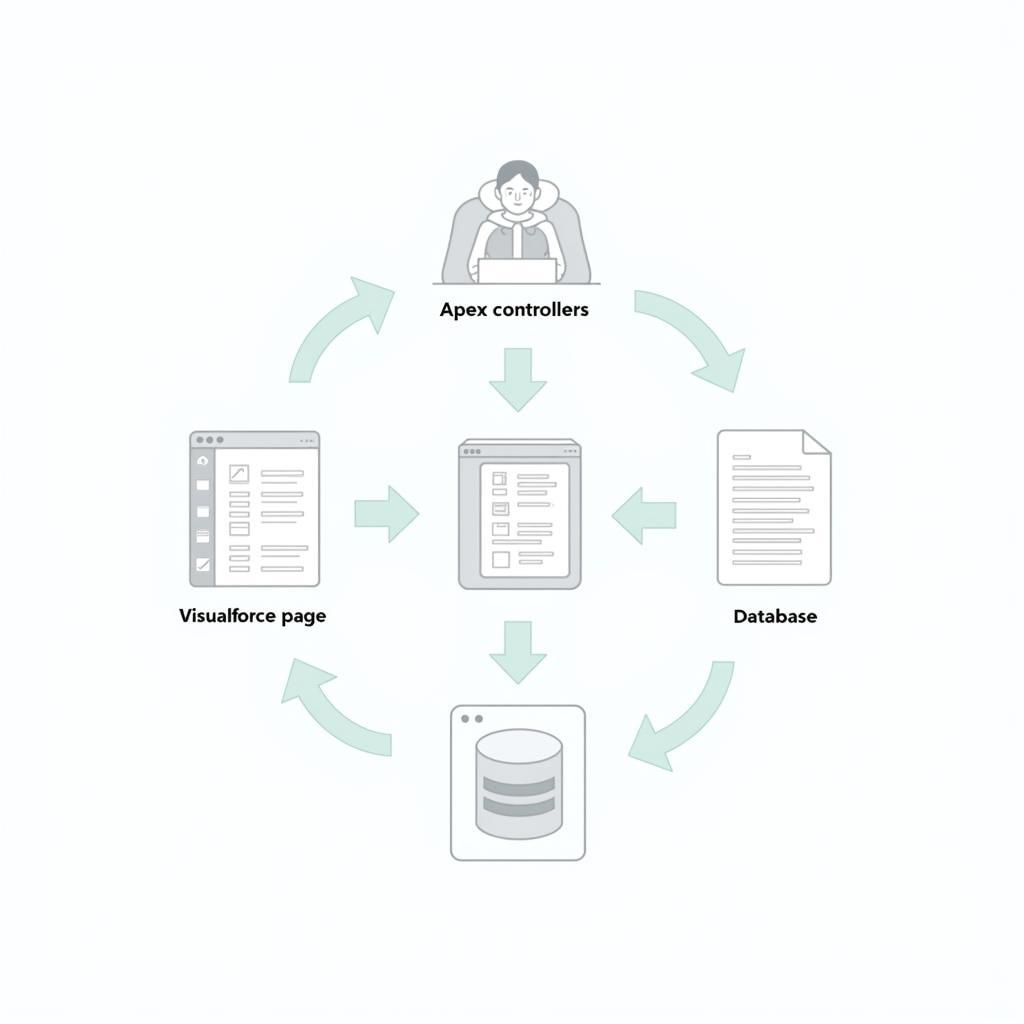Mastering Apex Controllers: A Comprehensive Guide
December 7, 2024Apex Controllers are the backbone of any complex Salesforce application, acting as the intermediary between the user interface and the database. They govern the flow of data, handle user interactions, and enforce business logic. Within the first 50 words, we’ve established the importance of understanding apex controllers.
Understanding the Role of Apex Controllers
Apex controllers are classes written in Apex, Salesforce’s proprietary programming language, specifically designed to manage the logic behind user interactions with Visualforce pages, Lightning components, and other custom interfaces. They are crucial for manipulating data, handling user input, and ensuring data integrity. Think of them as the traffic controllers of your Salesforce org, directing the flow of information and keeping everything running smoothly.
 Apex Controllers Diagram
Apex Controllers Diagram
Why are Apex Controllers Important?
They are essential for a variety of reasons:
- Data Manipulation: Apex controllers allow you to retrieve, create, update, and delete records in your Salesforce database.
- Business Logic Enforcement: They ensure data integrity by enforcing validation rules and other business requirements.
- User Interface Interaction: Controllers handle user input from Visualforce pages and Lightning components, processing the data and returning appropriate responses.
- Custom Functionality: They enable you to create custom functionalities tailored to your specific business needs.
Key Features and Functionalities of Apex Controllers
- Methods: Controllers use methods to perform specific actions, such as querying the database or updating records. These methods are called from the user interface.
- Variables: Controllers store data in variables, which can be accessed and manipulated by the controller’s methods.
- Constructors: Constructors are special methods that are called when a controller is instantiated. They are used to initialize the controller’s variables.
- Governors: Apex governors are limits put in place by Salesforce to ensure the efficient use of resources. Controllers must adhere to these limits.
Best Practices for Apex Controllers
- Keep it concise: Write efficient and focused code to minimize execution time and resource consumption.
- Use descriptive names: Choose clear and descriptive names for your variables and methods to improve code readability.
- Follow security best practices: Implement proper security measures to protect sensitive data.
- Test thoroughly: Thorough testing is crucial to ensure that your controller functions correctly and handles all possible scenarios.
Integrating Apex Controllers with Visualforce and Lightning Components
Apex controllers seamlessly integrate with both Visualforce and Lightning components, enabling you to create dynamic and interactive user interfaces. They provide the logic that powers these interfaces, handling user interactions and updating the display based on user input and data changes. Check out our article on apex r1 for more information. For robotics enthusiasts, our craft robotics article might be of interest.
Conclusion
Apex controllers are the heart of complex Salesforce applications, providing the logic and functionality that drive user interactions and data management. Mastering apex controllers is essential for any Salesforce developer aiming to build robust and efficient applications. Explore our f1 24 car setup guide for optimizing performance in a different context.
FAQ
- What is the difference between a controller and a Visualforce page?
- How do I call a controller method from a Visualforce page?
- What are Apex governors and why are they important?
- How do I test an Apex controller?
- What are some common use cases for Apex controllers?
- How can I improve the performance of my Apex controllers?
- What are the best practices for writing secure Apex controllers?
Need help with setting up your controllers? Contact us at Phone Number: 0915117113, Email: [email protected] or visit us at Address: Hamlet 3 Binh An Residential Group, Phu Thuong, Viet Nam, Binh Phuoc 830000, Vietnam. We have a 24/7 customer support team.